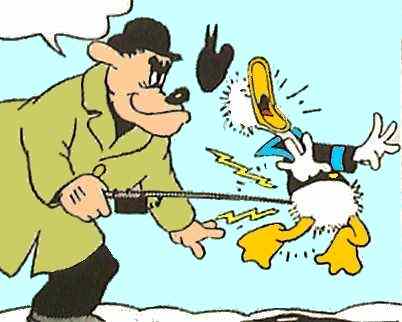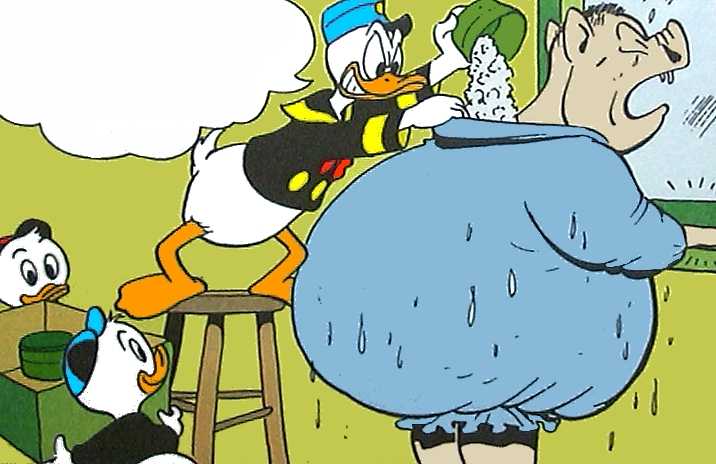
(WDCS064) 'Silent Night' - 1945
|
|
 
(WDCS144) 'The Golden Apples' -
1952
and
(WDCS196) 'Bobsled Race' - 1957
|
|

(WDCS215) 'The Milkman Story' -
1957
|
During the
time Barks drew his comic book stories the USA
was swept with waves of morals codes which were
intended to save the young readers from certain
topics; no
mentioning of death, no excessive violence, no
unnecessary pain, no adult themes, no sex, no
showing of crooked lawmen, and many more. Barks
was always very careful not to cross the
boundaries, but in a few instances his publishers
felt he had, which resulted in rejected stories:
In 1945 Barks drew a 10-page Christmas story
intended for WDCS064 and later known as 'Silent
Night', in which Donald Duck quarrels with
neighbour Jones while he and the nephews are
attempting to sing carols. In the end scene
Donald is tortured with an electric cattle prod.
Western found the story far too violent and it
was not published until 1990 when it appeared in
the CBL (Carl Barks Library).
In 1952 Barks made another 10-page story intended
for WDCS144 and later known as 'The Golden Apples'
but it was vetoed by Western. It has since been
lost. To the best of Barks' recollection it was
based on the Greek myth of The Apples of the
Hesperides, and took place during an apple
festival at which Daisy appeared as a jealous and
crusty battleaxe and that got it rejected. See
more HERE.
Even as late as 1957 Barks wrote a 10-pager which
was deemed unsuitable for publication. It was
intended for WDCS196 and would - again to the
best of Barks' recollection - have been titled 'Bobsled
Race'. The plot circled around violent arguments
between Donald and the nephews. It is now lost.
One year before Western had warned Barks that he
was to tone down the violent relationship between
the two parties as a direct result of a complaint
from a mother. She had objected to Donald saying
'Shut up' to his nephews in the closing
panel of WDCS186 'Ice Taxies'.
The same year another 10-pager, intended for WDCS
215, was shelved. It was simply archived as 'The
Milkman Story' and it tells a tale about Donald
being a perfect milkman until he becomes
extremely violent and revengeful towards a very
irritating customer. The story was finally
published in the Dutch Donald Duck magazine #47
from 1974, and - after having been published in
several other European countries - in WDCS550
in 1990.
|

